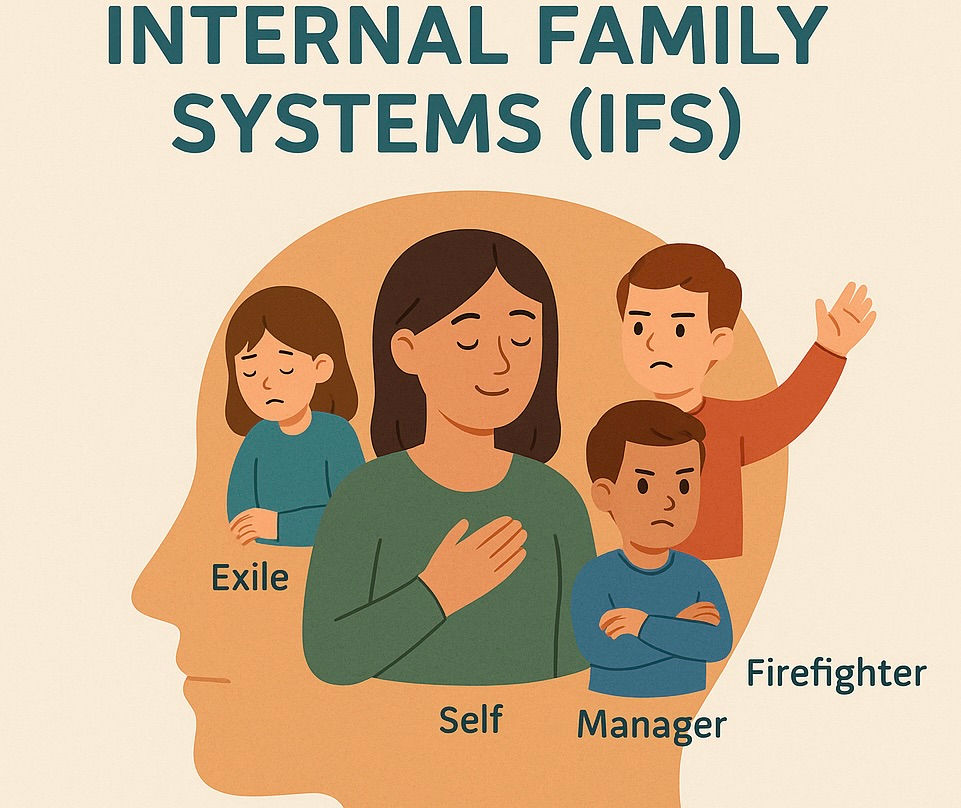Introduction to Internal Family Systems (IFS)
- ojuzyc
- Jul 24, 2025
- 3 min read
Internal Family Systems (IFS) is a model developed by Richard Schwartz in the 1980s that views the mind as composed of distinct sub-personalities or "parts." Each part has its own perspectives, memories, and roles, interacting with one another like a family system.
Core Concepts of IFS
Parts: IFS identifies three primary types of parts: Managers, Exiles, and Firefighters. Managers aim to maintain control and prevent pain, Exiles carry trauma and pain, and Firefighters act impulsively to distract from emotional distress.
Self: The Self represents the true essence of a person, characterized by qualities such as calmness, curiosity, compassion, and confidence.
Internal Conflict: Internal conflict arises when different parts have opposing goals or desires, leading to feelings of distress or dysfunction.
Internal Family Systems (IFS) Process
The IFS process typically involves the following steps:
Identifying Parts: Individuals recognize and name their various parts.
Building Relationships: Clients develop relationships with their parts, understanding their roles and motivations.
Listening to Parts: Clients are encouraged to listen to the concerns and needs of their parts, fostering communication.
Facilitating Healing: The Self provides compassion and understanding to wounded parts, facilitating healing and integration.
While the overarching framework of IFS is consistent, different types of internal family systems can emerge based on an individual's unique experiences and emotional landscape. These variations often depend on one's upbringing, personal experiences, and internal conflicts. Here are a few common parts that people may identify within themselves:
Exiles: These parts often carry pain, trauma, or memories from past experiences. They are typically suppressed or hidden away due to their overwhelming nature. These are often inner children.
Managers: These parts strive to maintain control and prevent harm by managing daily emotions and responses. They can be protective but may also lead to rigid behaviors.
Firefighters: When exiles are triggered, firefighters spring into action. They are impulsive and act to distract or numb the pain, sometimes through unhealthy coping mechanisms.
Can you identify examples of the above parts/behaviours in yourself?
For example, maybe a part of you is still sad about an event that happened in the past (Exile), a part manages your life in a way that aims to not repeat the pain (Manager), and maybe a third part acts out when it perceives a threat (Firefighter).

In the Internal Family Systems model, a person's system can contain a Core Self, exiled parts that hold pain, Managers that try to maintain control, and Firefighters which often respond more strongly when triggered.
Recognizing these types of parts can empower individuals to approach their emotions with curiosity rather than fear. For example, someone grappling with anxiety might identify a firefighter part that leads them to procrastination. By understanding this dynamic, they can work toward healing.
In my extensive client experience, whether you are losing sleep or struggling to get something done, most parts that come up for people long to be loved and soothed, especially when they are scared. If you get in touch with a part of yourself, ask it what it needs to feel safe, be patient and show it some love in a way that is comfortable and nourishing for this part of you.
Applications of Internal Family Systems (IFS)
Internal Family Systems (IFS) can be applied in various contexts, including:
Individual Coaching: Assisting clients in navigating personal issues, trauma, and emotional distress.
Couples Coaching: Helping partners understand their individual parts and improving communication.
Group Coaching: Facilitating shared experiences and insights among participants.
Personal Development: Encouraging self-exploration and growth through understanding internal dynamics.
Transforming With Internal Family Systems
Embarking on a journey of self-discovery and healing through parts work can be transformational. Internal Family Systems offers a unique and compassionate approach to understanding the complexities of the human mind. By recognizing and integrating various parts, individuals can achieve greater emotional balance and well-being. If you choose to embark on this deep self-exploration, embrace the path ahead with curiosity, compassion, and commitment to your well-being. You are bound to find some amazing surprises ahead!

Comments